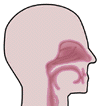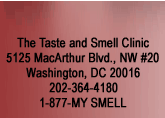  |
||
 |
Most
patients who develop taste and smell dysfunction follow a similar pattern
of response. First, they are surprised that this dysfunction occurs since
they have heard little or nothing about this problem. Second, they go to
their family physician and learn that he/she also has little or no experience
with these problems. Third, they are usually referred to a specialist physician,
an ENT doctor, or a neurologist and they learn that these specialist physicians
also have little or no experience with taste and smell problems. Fourth,
they feel discouraged and unhappy—they are usually told that there is nothing
that can be done to help them and that they will have to learn to live
with their problem the way it is.
How is this scenario possible in the face of the present advanced state of modern medicine? We are making so many advances in genetics, stem cell applications, and cardiovascular and oncological diseases—what is the problem with the lack of information about taste and smell dysfunction? The problem has been exposed by recent articles that appeared in the United Kingdom—one written by a patient at The Taste and Smell Clinic and published in The New Scientist in September 2005 and another published in December 2005 in The London Daily Mail. These articles generated a small avalanche of telephone calls and emails to The Taste and Smell Clinic in the United States from patients in the UK who had the same experiences as patients in the US—their physicians had little or no knowledge of taste and smell problems, did not know how to apply diagnostic or therapeutic techniques to these problems, and told their patients that nothing could be done to help them. Indeed, several physicians emphatically told their patients that there were no medically accepted treatments for the loss of smell. At The Taste and Smell Clinic in Washington, DC, my associates and I have been dealing with these problems for more than 40 years. I personally have evaluated and treated more than 5,000 patients with these problems, initially with very modest success and lately with much greater success—more than 2/3 of all patients now regain some if not all of their sensory dysfunction. But with an estimated 19 million patients with these problems in the US, the evaluation and treatment of 5,000 patients is a “drop in the bucket” compared to the needs of millions of others. Why do other physicians not focus on these problems and help these millions of patients? First, patients generally do not die from the loss or distortion of taste and/or smell. Second, these problems are “hidden handicaps,” since there are usually no anatomical or overt biochemical changes in blood or urine to alert a physician to the nature of the problem. Third, these problems were never discussed in any formal manner in the training of most physicians, so they are usually unfamiliar with the basic anatomy, biochemistry, or pathology related to these problems. What is the solution to this issue? The answer is not clear. There is no major financial benefit to drug companies dealing with these problems since all the drugs currently used to treat these problems have been on the market for years. Developing “off-label” uses for drugs requires significant financial expenditure and, to drug companies, the market for these drugs is uncertain. Since there are few physicians who know anything about these problems, marketing a drug to help patients with taste and smell problems would require a massive educational campaign and the refocusing of a drug company’s mission. Thus, a tautology exists: there are few physicians who know anything about these problems and there is no effort to teach these few physicians, in undergraduate or graduate medical educational processes, since taste and smell problems are either hidden, considered cosmetic or social, or not related to important medical issues such as cancer or heart disease. While we at The Taste and Smell Clinic are aware of these issues and are trying to reach out to others to make them aware of the existence of these problems and their solutions, we are at present a voice in the wilderness. Something must be done to raise public awareness of these clinical problems so that the many millions of patients who suffer with the loss and/or distortion of taste and/or smell function can be treated like any other patient with distressing medical complaints. How this will be done is currently unclear, but I want you to know that I have dedicated my life to helping you achieve not only recognition of these problems but solutions to them. You can help by raising your voices to anyone who will listen so that these problems can be addressed and solved. Much needs to be done, not only by us at The Taste and Smell Clinic, but by many others who may be able to give greater insight to solve these perplexing and difficult sensory problems. Home
| The Clinic | Diagnosis
| Treatment | FAQ
| Press
|
|